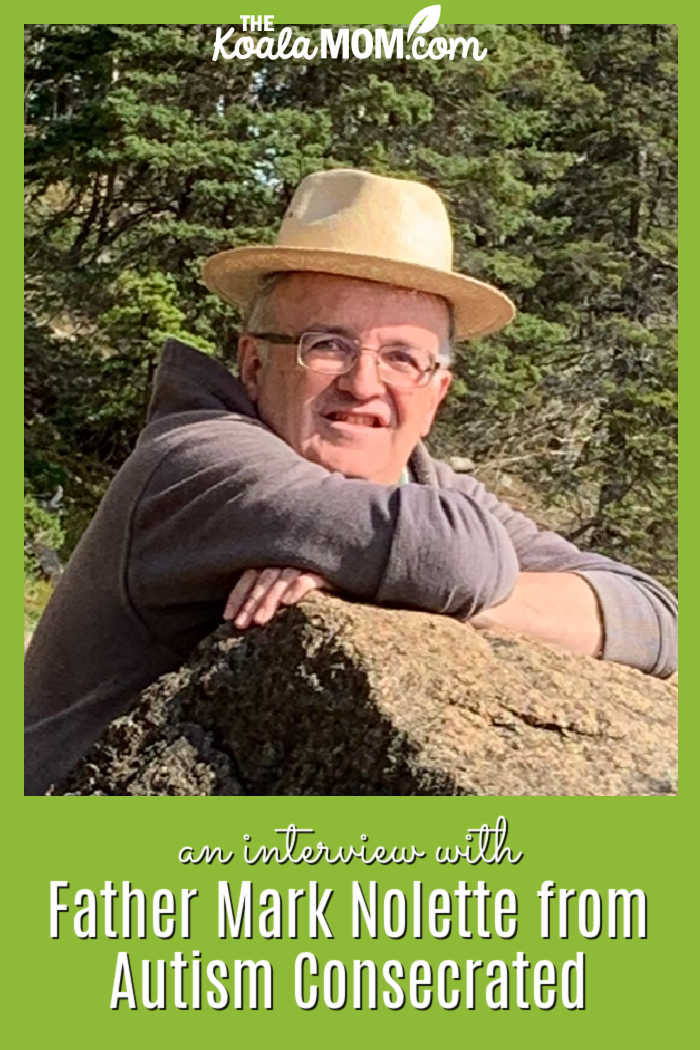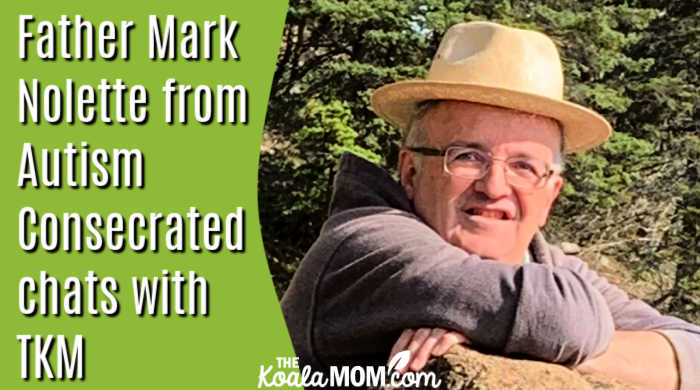Over the past four years, mostly in response to my son’s needs as he started school, I’ve spent a lot of time researching ADHD and autism. As I learned more about the neurodiversity in my own family, I’ve connected with other moms in my community who are neurodiverse or raising neurodiverse kids (or both). I’ve also become more aware of the ways in which our society and church are either welcoming or not to people with ADHD, autism, and other needs.
Recently, in one of my many Catholic or homeschooling groups, someone shared a link to Autism Consecrated. I was immediately drawn to this website, which seeks to reach out to Catholics with autism and create a welcoming space for them in Catholic churches. As a mom who has struggled to help my ADHD son make it through Mass, I have deep sympathy for the ways in which church and faith can be difficult for those whose brains work differently.
While I enjoy diving deep into research through websites and books, I also really appreciate speaking with people who have personal experience. And so I reached out to the founders of Autism Consecrated to see if they’d be willing to chat with me about autism, faith, and their ministry. I’ve done a lot of interviews for my blog now, but this was one of the most difficult for me, as I felt very aware of my ignorance on this topic. I’m deeply grateful to Father Mark Nolette and Aimee O’Connell for taking time to answer my questions and to be present for anyone seeking answers on the topic of autism and Catholicism.

What is Autism Consecrated?
From their website: Autism Consecrated was founded in 2020 by an autistic Catholic priest and an autistic Lay Carmelite. We bring to this apostolate our lived experience, our areas of expertise, and our desire to serve God through our autism. Our purpose is to be a living example of autism’s belonging in the Body of Christ, and to help others realize their own value and place as autistic members of the Church. We offer prayer, spiritual direction, vocational support, consultation to parishes and communities, and a place where autistic people may know they are loved and treasured by God. We are exclusively online, and we communicate exclusively through email and text. Our methods focus on individual connection, getting to know each person who reaches out to us individually. We are primarily rooted in prayer: for specific intentions brought to us, and in general, for better understanding and belonging of autistic people in the Church.
Here is my interview with Father Mark Nolette.
TKM: Can you tell us a bit about yourselves?
Father Mark Nolette: I was ordained a priest of the Diocese of Portland, Maine, in 1987. My priestly ministry consisted of mainly parish and Tribunal work. After discerning a call to a more contemplative way of life, I was given permission to live as a hermit in 2010. I fully retired from active ministry in 2020 and, the following year, moved to the Rochester, New York area in order to be more involved with Autism Consecrated.
TKM: How/when were you diagnosed with autism?
Father Mark Nolette: In 2012, someone made an offhand comment to me that I seemed “mildly autistic”. Though I knew little about autism at the time, this resonated with me and I sought out more information on autism. In 2014, at the age of 55, I was formally diagnosed with Asperger’s Syndrome, which since then has been included under the umbrella of Autism Spectrum Disorder.
TKM: It’s said that if you’ve met one person with autism, you’ve met one person with autism. Can you give us a brief glimpse of what autism is like for you or how it affects your life?
Father Mark: My social batteries are limited. Any interaction with others, even people I enjoy being with, will drain me fairly quickly. Upcoming changes in routine produce anxiety in me, even when I know what the changes will be and when I can return to my usual routine. The social drain increased as I grew older, so I can no longer preside at a public Mass (as much as I love the Mass). I am very sensitive to certain sounds. On the other hand, even if I may seem to be calm and cool on the outside, I have hyper-empathy on the inside. I have a good memory and am intelligent on the whole. If you were playing Trivial Pursuit, you’d want me on your team!
TKM: Can you share a bit about how you discerned your vocation? How did your autism affect that discernment?
Father Mark Nolette: At the time I was discerning my vocation to the priesthood, I did not know that I was autistic. Nevertheless, my autism was a part of that discernment and a part of that vocation. My autism was no accident. The Lord intended me from the beginning to be autistic and a priest. One of my great interests, even as a child, was Catholic “stuff”. I felt drawn to the Mass because I felt drawn to be close to the Lord. As such, my vocation did not arise from the desire to do many things but simply to be with the Lord. Everything else about being a priest was secondary to that.
TKM: What is one way that autism is a cross for you? What is one way that autism is a blessing for you?
Father Mark: Although I see what you are getting at, the wording of this question seems to imply that autism is something I can isolate from myself and look at, as though it were a cold or an allergy. I am not a person who happens to have autism; I am autistic. I can no more conceive of myself apart from my autism than I can conceive of myself with no blood!
That being said, I’d respond in this way. One of the major difficulties in being autistic is seeing how much bias there is among many people, even in the Church, against autistic people. Most of these people would never believe that they are biased at all. But they are.
One of the blessings in being autistic can be described as the “canary in the mine” phenomenon. It was common practice among coal miners a century or so ago to take canaries with them into the mines. The canaries were more sensitive to the presence of poisonous gases than the miners, so if the miners saw the canaries getting sick, they knew there was poison gas in the mine and they’d get out.
How is this a blessing? This gift is not so much a blessing for me as an autistic person as it is for the community as a whole. I can see through “spin” and perceive difficulties and incongruities sooner than the average person, not unlike the autistic software developer who can see bugs in the code before anyone else. It is a blessing for the community when the community sees it as a blessing and chooses to take heed.
TKM: What do you wish more Catholics knew about autism?
Father Mark Nolette: Autism is not a disease that affects only children. The children grow up. Autistic adults still need welcome and acceptance. It doesn’t take rocket science or great financial resources to welcome autistic people. It takes people, filled with the Spirit of Christ, who see autistic people as people who, like everyone else, have something to offer as well as needs. Welcoming the autistic person requires conversion on the part of the Catholic community as well as the autistic person.
TKM: What can the average Catholic do to be more aware and welcoming toward neurodiverse people?
Father Mark: Talk to us rather than to “experts” about us! We will appreciate every effort you make, even if we tire quickly. Let us tell you about our interests. Find out from us what would help us feel more included in your parishes. In other words, treat us like people. After all, we are.
TKM: Besides your own website, what’s one resource you’d recommend on the topic of autism for Catholics?
Father Mark Nolette: Our website lists a number of resources. You asked for one, but I will give you two: Autism and the Church by Grant Macaskill and Autism and Worship by Leon van Ommen. Both of these authors are/were part of the Center for Autism and Theology at the University of Aberdeen in Scotland. Neither is Catholic, but there is little in either book that would be contrary to Catholic teaching. Besides, I have yet to see anything in English by a Catholic author on autism that can touch either of these books. I’d love to be proven wrong someday!
TKM: What’s your favorite meal?
Father Mark: Breakfast!!! Full stop.

To read more of Father Mark’s reflections as an autistic priest-hermit, learn about Catholic precepts from an autistic perspective, or find more resources on faith and autism, drop by the Autism Consecrated website. You can also support their work through prayer and donations.
Heavenly Father: We pray that the Church may strive toward supporting its neurodivergent members through the holy example of Saint Thorlak. May the Church follow his pattern of hospitality and humility in building communities where the autistic members of the Body of Christ may thrive, lead, and receive the spiritual nourishment of belonging. We ask this through Christ, Our Lord: Amen.

No Responses Yet